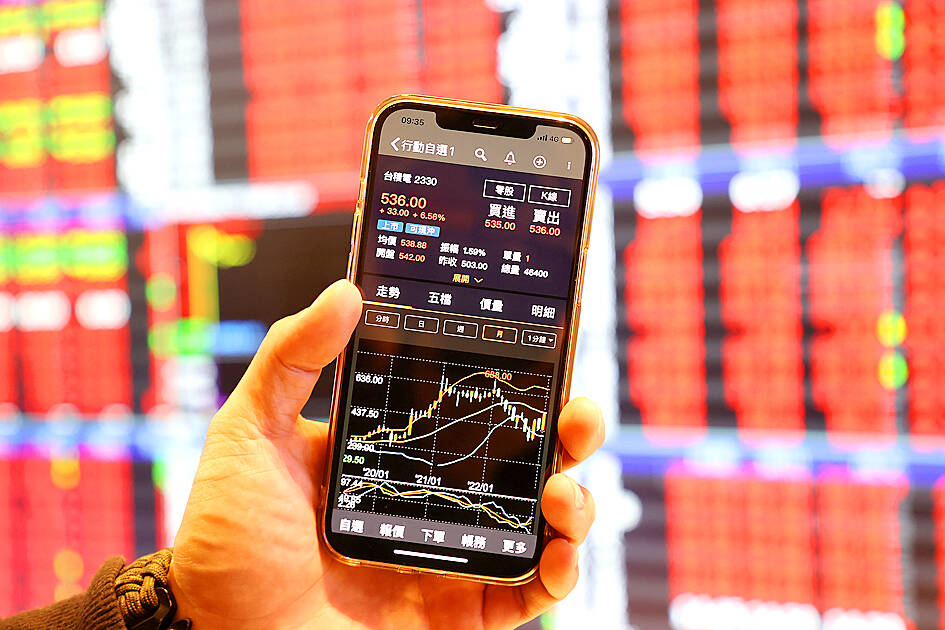Taiwan’s benchmark stock gauge yesterday entered a bull market as trading resumed after the Lunar New Year holiday, with a broad rebound in chip shares boosting foreign buying in the market. The New Taiwan dollar also strengthened against the US currency.
The benchmark TAIEX rose 560.89 points, or 3.76 percent, to 15,493.82, its best day since May 2021, with turnover totaling NT$329.72 billion (US$10.94 billion). That took TAIEX’s gains from an October low to 22 percent, Taiwan Stock Exchange data showed.
Yesterday’s upturn was led by the bellwether electronics sector, especially large semiconductor stocks. Taiwan Semiconductor Manufacturing Co (台積電), the world’s largest contract chipmaker, and MediaTek Inc (聯發科), the nation’s largest handset chip designer, contributed the most to the index’s advance, closing up 7.95 percent and 6.64 percent respectively.

Photo: CNA
Speculation that the US Federal Reserve is nearing the end of its aggressive interest rate hike cycle along with broad optimism in the region due to China’s reopening after easing its strict COVID-19 controls have spurred a comeback for the tech-heavy market after stocks slid for most of last year.
The TAIEX fell 22.4 percent last year.
Big investors including Warren Buffett are also betting that the worst is over for chipmakers amid attractive valuations and easing tensions between China and the US.
Foreign institutional investors yesterday bought a net NT$72.26 billion of local shares on the main board, the highest amount since Dec. 28, 2005, when they recorded a net purchase of NT$125.28 billion, Taiwan Stock Exchange data showed. Foreign funds have snapped up US$4.6 billion in shares year-to-date, Bloomberg-compiled data showed.
Goldman Sachs Group Inc upgraded Taiwan to “market-weight” from “underweight” on Friday, citing positive trade exposure to China’s reopening, a strong tech cycle recovery in the second half of this year and reduced near-term geopolitical risks as among tailwinds for the market.
However, markets elsewhere in Asia were mixed. In the first trading session after a week-long break, the Shanghai Composite Index added 0.14 percent to 3,269.32 and the Shenzhen Composite Index on China’s second exchange rose 1.16 percent to 2,150.38, but Hong Kong’s Hang Seng lost 2.73 percent to 22,069.73 on heavy selling of technology shares.
Tokyo’s Nikkei 225 rose 0.2 percent to 27,433.40. South Korea’s KOSPI lost 1.3 percent to 2,450.65 and the S&P/ASX 200 in Sydney shed 0.2 percent to 7,481.70, while India’s SENSEX declined 0.4 percent and Bangkok’s SET edged less than 0.1 percent lower.
Meanwhile, the NT dollar advanced to the strongest level since August last year, ending 0.76 percent higher at NT$30.137 versus the greenback yesterday in Taipei trading.
The NT dollar “is playing catchup to gains in regional FX, as markets reopened from a week-long holiday. Sentiments remain conducive with the TAIEX, Philadelphia Semiconductor Index extending gains, while the China reopening story supports growth hopes,” said Christopher Wong (黃經隆), foreign exchange strategist at Oversea-Chinese Banking Corp (華僑銀行) in Singapore.
Additional reporting by AP and staff writer

NEW IDENTITY: Known for its software, India has expanded into hardware, with its semiconductor industry growing from US$38bn in 2023 to US$45bn to US$50bn India on Saturday inaugurated its first semiconductor assembly and test facility, a milestone in the government’s push to reduce dependence on foreign chipmakers and stake a claim in a sector dominated by China. Indian Prime Minister Narendra Modi opened US firm Micron Technology Inc’s semiconductor assembly, test and packaging unit in his home state of Gujarat, hailing the “dawn of a new era” for India’s technology ambitions. “When young Indians look back in the future, they will see this decade as the turning point in our tech future,” Modi told the event, which was broadcast on his YouTube channel. The plant would convert

‘SEISMIC SHIFT’: The researcher forecast there would be about 1.1 billion mobile shipments this year, down from 1.26 billion the prior year and erasing years of gains The global smartphone market is expected to contract 12.9 percent this year due to the unprecedented memorychip shortage, marking “a crisis like no other,” researcher International Data Corp (IDC) said. The new forecast, a dramatic revision down from earlier estimates, gives the latest accounting of the ongoing memory crunch that is affecting every corner of the electronics industry. The demand for advanced memory to power artificial intelligence (AI) tasks has drained global supply until well into next year and jeopardizes the business model of many smartphone makers. IDC forecast about 1.1 billion mobile shipments this year, down from 1.26 billion the prior

People stand in a Pokemon store in Tokyo on Thursday. One of the world highest-grossing franchises is celebrated its 30th anniversary yesterday.

Zimbabwe’s ban on raw lithium exports is forcing Chinese miners to rethink their strategy, speeding up plans to process the metal locally instead of shipping it to China’s vast rechargeable battery industry. The country is Africa’s largest lithium producer and has one of the world’s largest reserves, according to the US Geological Survey (USGS). Zimbabwe already banned the export of lithium ore in 2022 and last year announced it would halt exports of lithium concentrates from January next year. However, on Wednesday it imposed the ban with immediate effect, leaving unclear what the lithium mining sector would do in the